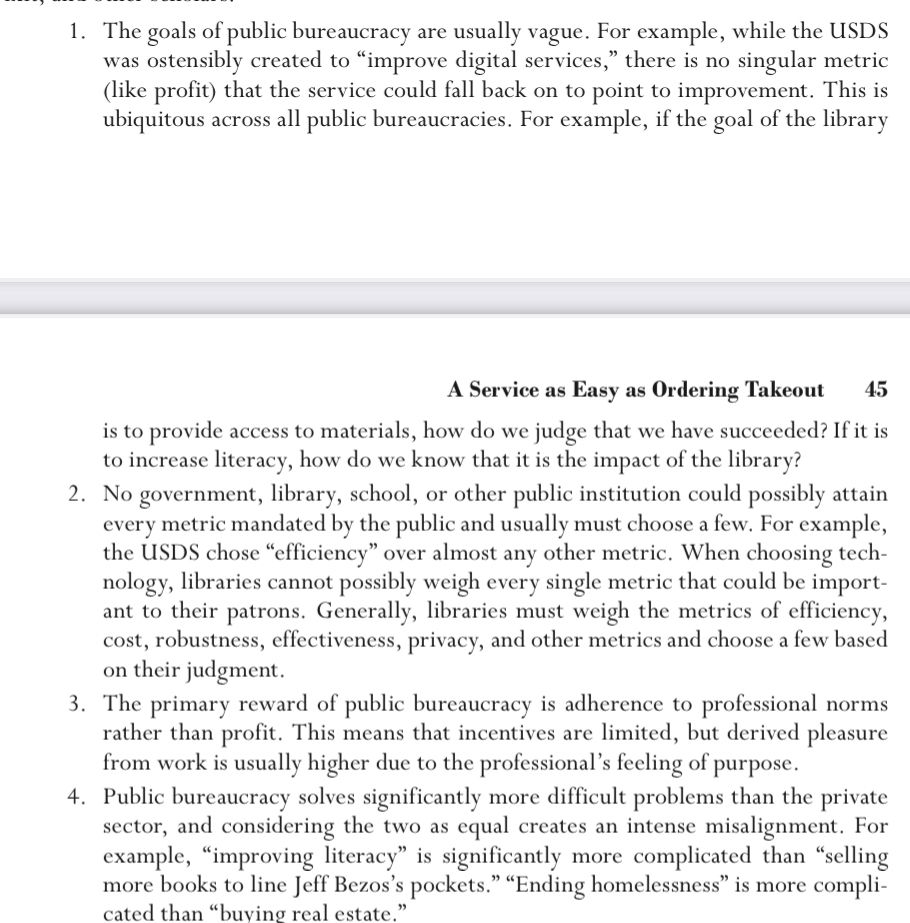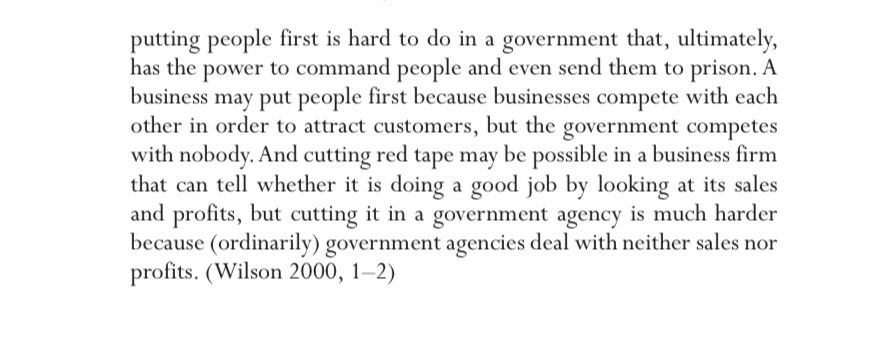Did you get a fit off?
29.06.2025 02:21 — 👍 1 🔁 0 💬 0 📌 0Dan Sharpe
@dansthe3rd.bsky.social
@dansthe3rd.bsky.social
Did you get a fit off?
29.06.2025 02:21 — 👍 1 🔁 0 💬 0 📌 0The wedding or the table?
29.06.2025 02:09 — 👍 2 🔁 0 💬 1 📌 0
1. The goals of public bureaucracy are usually vague. For example, while the USDS was ostensibly created to "improve digital services," there is no singular metric (like profit) that the service could fall back on to point to improvement. This is ubiquitous across all public bureaucracies. For example, if the goal of the library A Service as Easy as Ordering Takeout 45 is to provide access to materials, how do we judge that we have succeeded? If it is to increase literacy, how do we know that it is the impact of the library? 2. No government, library, school, or other public institution could possibly attain every metric mandated by the public and usually must choose a few. For example, the USDS chose "efficiency" over almost any other metric. When choosing tech-nology, libraries cannot possibly weigh every single metric that could be important to their patrons. Generally, libraries must weigh the metrics of efficiency, cost, robustness, effectiveness, privacy, and other metrics and choose a few based on their judgment. 3. The primary reward of public bureaucracy is adherence to professional norms rather than profit. This means that incentives are limited, but derived pleasure from work is usually higher due to the professional's feeling of purpose. 4. Public bureaucracy solves significantly more difficult problems than the private sector, and considering the two as equal creates an intense misalignment. For example, "improving literacy" is significantly more complicated than "selling more books to line Jeff Bezos's pockets." "Ending homelessness" is more complicated than "buving real estate

putting people first is hard to do in a government that, ultimately, has the power to command people and even send them to prison. A business may put people first because businesses compete with each other in order to attract customers, but the government competes with nobody. And cutting red tape may be possible in a business firm that can tell whether it is doing a good job by looking at its sales and profits, but cutting it in a government agency is much harder because (ordinarily) government agencies deal with neither sales nor profits. (Wilson 2000, 1-2)
My new paper describes why the “business ontology” is a fallacy, and how the business-centered technocratic approach to digital service delivery made agencies like USDS uniquely vulnerable to takeover under a malicious regime. journals.library.wustl.edu/pollib/artic...
17.04.2025 12:29 — 👍 164 🔁 37 💬 5 📌 6Duo has been roasting me
02.12.2024 21:50 — 👍 2 🔁 0 💬 1 📌 0You’re doing great work, and people are noticing!
29.11.2024 20:56 — 👍 1 🔁 0 💬 0 📌 0Let me get that Cave of Wonders…
22.11.2024 20:16 — 👍 1 🔁 0 💬 0 📌 0The alt text 😂
15.11.2024 17:52 — 👍 1 🔁 0 💬 1 📌 0If he keeps this up, he’s about to have a bunch of dudes painting their nails and singlehandedly make Pennsylvania go blue in ’28… 🙌🏽💅🏽
15.11.2024 06:50 — 👍 2 🔁 0 💬 0 📌 0